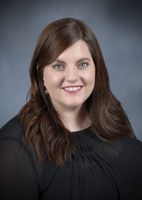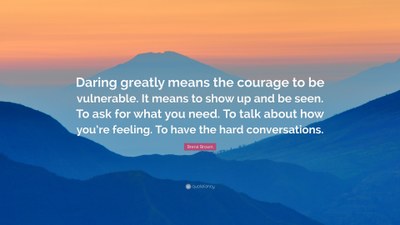Good Enough: Vulnerability and Shame in Medicine
Have you ever experienced failure as well as the shame and vulnerability that accompanies that experience? We don’t talk much about failure as physicians, but it does happen and can have devastating consequences. I recommend you take five minutes to read this blog post, originally published in Louisville Medicine by Dr. Natalie Henderson, one of our faculty members in the Department of Pediatrics. Natalie has graciously given us permission to publish this exceptional piece as a blog post in Faculty Feed. I suggest that you heed her advice at the end of the article.
- G.Rabalais, MD

“We regret to inform you…”
Five words. Five words that anyone who has ever taken a standardized exam, waited for acceptance to a school or program or team, or applied for a much-anticipated job does not want to see. Your brain instantly reads nothing else. Likely, you have been waiting for a different five words, “It is with great pleasure…” You would settle for a single “Congratulations.” Yet, more people than we realize have found themselves sitting in a state of disbelief wondering what is next. We instinctively start thinking even more dangerous five-word phrases like, “How will people judge me?”, “Will I get a residency?” or “Will I lose my job?”
 Let’s be real here. Failure is something we will all face in our careers. It may manifest itself as a failed exam, a missed diagnosis, a lawsuit, poor teaching evaluations, marital strife, parenting struggles, financial mishaps, visa issues or student loan burdens. For far too many of us, these failures lead to shame.
Let’s be real here. Failure is something we will all face in our careers. It may manifest itself as a failed exam, a missed diagnosis, a lawsuit, poor teaching evaluations, marital strife, parenting struggles, financial mishaps, visa issues or student loan burdens. For far too many of us, these failures lead to shame.
Brené Brown, a well-known researcher on shame and vulnerability says, “Shame is the most powerful, master emotion. It’s the fear that we’re not good enough.” I would argue that shame, rather than success, is the emotion driving our desire to never see those words. In medicine, we strive, toil, and sacrifice our money-making, baby-making, tailgating years to spend our time learning, cramming and dissecting only to have numerous exams tell us whether we are “good enough” or in many cases, “not good enough.”
In her book Daring Greatly: How the Courage to Be Vulnerable Transforms the Way We Live, Love, Parent, and Lead, Brown expands on the idea of shame in the way that intimately illustrates the experience faced by many in medicine. She says “We live in a world where most people still subscribe to the belief that shame is a good tool for keeping people in line. Not only is this wrong, but it’s dangerous. Shame is highly correlated with addiction, violence, aggression, depression, eating disorders, and bullying.”

Research is emerging to support this idea. An AMA publication from 2019 showed two out of every three physicians screen positive for mental health issues or depression, and medical students have a three times higher rate for suicide than their same age counter parts. Hierarchal systems in medicine have created an undercurrent for learners to view their leaders as infallible and unflappable. We often pimp our trainees in a punitive manner, rather than one to acquire knowledge and pull from previous learning experiences. Our shame prevents us from allowing those we are responsible to know that we also struggle. This, inevitably, leaves our students, residents, and fellows stating to themselves, yet again, “I am not good enough.”
If shame is the culprit, vulnerability may very well be the cure. So, let me tell you my story. I failed the pediatric critical care board exam. Twice. By one question each time. Our board exams are offered every other year at over three thousand dollars per sitting. Redeeming myself was not a quick or painless process. Until I passed the exam on the third attempt, you could not convince me that my partners did not view me relative to my lack of a passing score or judge my medical decision making. I felt like an imposter on rounds, teaching at the medical school, winning awards. To be honest, the sense of being a fraud seeped into the very sense of who I thought myself to be inside and outside of medicine. I sat in meetings listening to how recruiting intensivist and fellow candidates who could pass the board exam was of the highest importance. I would think, “I am a really good doctor. I know how to connect with patients and yet I can’t pass this damn test.” I saw people who were less than stellar at communicating and the nuance of interpersonal interactions sail through exams. With a lot of reframing, therapy, hard work, and self-love, I passed the exam on the third (and final) attempt.
The people in my daily life, both at work and at home, knew of my struggles around the failures. However, it wasn’t until I spoke on imposter syndrome in medicine to a group of medical students and told my story that I was fully vulnerable with the journey and what it cost me. I received a flood of emails from students thanking me for my honesty and transparency. They told me they wished more attending physicians were able to share their struggles so that students did not set such unattainable goals for themselves.
I am not cured of the shame culture and fear of vulnerability, but I am, at least now, aware of it and try to confront it in myself. If we as a medical community want to change the culture of education, improve the mental health of ourselves and trainees, and move forward into a more compassionate future, we must take small strides at sharing our struggles, being courageous enough to be wrong and admit, and strive towards vulnerability. So, I challenge you to tell your story. Maybe you could be the spark that changes the five words someone hears in their head to “You are more than enough.”
Resources
1. Brown Brené. (2015). Daring greatly: how the courage to be vulnerable transforms the way we live, love, parent, and lead. Avery, an imprint of Penguin Random House.